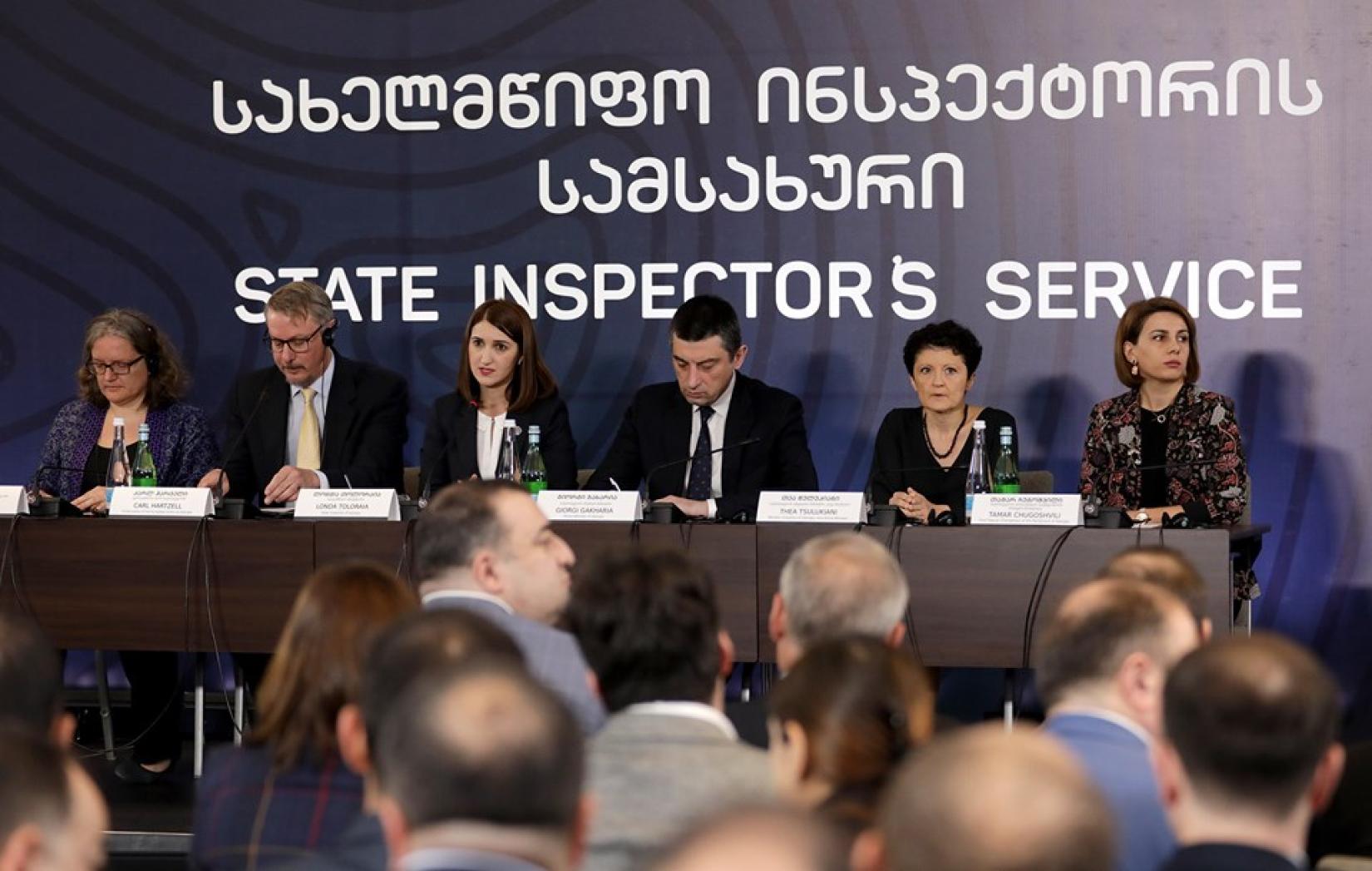From November 1, 2019 the State Investigation Function will be Launched
30 October 2019
- From November 1, 2019 the State Inspector’s Service will commence to perform its investigative power.

The Prime Minister of Georgia Giorgi Gakharia, the State Inspector of Georgia Londa Toloraia, the First Deputy Chairperson of the Parliament Tamar Chugoshvili, Minister of Justice Thea Tsulukiani, EU Ambassador to Georgia Carl Hartzell and UN Resident Coordinator in Georgia Sabine Machl opened the event dedicated to the launch.
The representatives of Government of Georgia, members of the Parliament of Georgia, representatives of other agencies, diplomatic corps, international organisations and non-governmental organisations attended the event.
Since 2014 the Office of the United Nations High Commissioner for Human Rights (OHCHR) as well as the Public Defender’s Office, international experts, and a number of human rights non-governmental organizations were actively advocating that Georgia creates an independent mechanism to investigate allegations of serious human rights abuses committed by law enforcement officials. OHCHR conducted workshops, trainings, roundtables and provide expertise to advance the discussions on the creation of such a mechanism. Moreover, OHCHR has provided suggestions on amendments to a draft law on the creation of an independent and impartial investigative mechanism. On July 21, 2018, the Parliament of Georgia adopted the law on the State Inspector Service of Georgia. From November 1, 2019 the State Inspector Service will have the mandate to investigate crimes mentioned below.
Starting from November 1, The State Inspector’s Service will be mandated to investigate crimes committed by representatives of law- enforcement authorities and by an official or a person equal to an official. In 2018, the Parliament of Georgia adopted the law on “the State Inspector’s Service.” The law mandated the State Inspector’s Service the independent and impartial investigative power of abovementioned specific crimes. Independent investigative mechanism was established by the state in response to the recommendations issued by the Public Defender of Georgia, international organisations and experts.
During her speech, Londa Toloraia stated that, the State Inspector’s Service is ready to fulfil its investigative function from November 1: “Investigative department is fully staffed with personnel having different working experience selected by contest and is equipped with technique and tools necessary for investigation.” The guest of the event received detailed information on the steps taken and implemented reform from the State Inspector. It was also mentioned by Londa Toloraia that effective functioning of the service largely depends on the coordination between different agencies.
On the first phase of the work the offices of the States Inspector’s Service will be opened in Tbilisi and Kutaisi and in East and West divisions of the investigative service sixteen investigators will be employed. Hot line (199), accessible for any interested person for 24 hours will start functioning. The State Inspector’s Service is a legal successor of the Office of Personal Data Protection Inspector. The Office of the Personal Data Protection Inspector was established as the State Inspector’s Service on May 10, 2019. The transformation was conditioned by the assignment of investigative function. From 2013, the Office was monitoring the lawfulness of personal data processing, covert investigative actions and activities performed within the central databank of electronic communications identification data.
The investigative jurisdiction of the State Inspector’s Service shall apply to the following crimes:
✓ Torture;
✓ Threat of torture;
✓ Inhuman or degrading treatment;
✓ Abuse of official powers committed using violence, weapon or offending personal dignity of the victim;
✓ Exceeding official powers committed using violence, weapon or offending personal dignity of the victim;
✓ Exceeding or abuse of official powers, committed using violence, weapon or offending personal dignity of the victim;
✓ Coercion of a person by deception, blackmail or other unlawful act to provide explanation, evidence or opinion;
✓ Coercion of a person placed in a penitentiary facility or liberty restriction facility into changing or refusing to give testimony, as well as coercion of a convicted person in order to interfere with the fulfilment of his/her civil duties;
✓ Other crimes which caused the death of the person, and when committing it, this person was in the temporary detention isolator or in penitentiary institution and/or in any other place, where he/she was forbidden to leave the place against his/her will by a representative of a law enforcement body, an officer or a person equal to him/her, and/or this person was otherwise under the effective control of the state.
The event was organised with the financial support of EU and UN joint project “Human Rights for All.”

